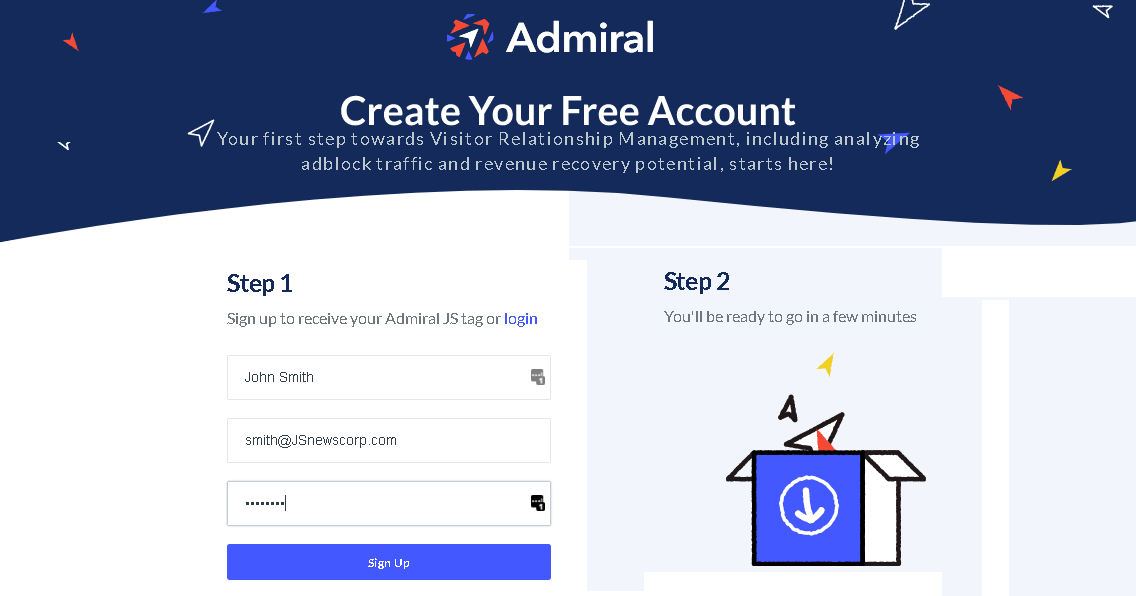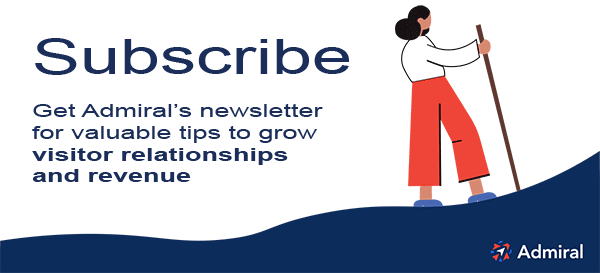Anti-adblock software and adblock walls are becoming the industry norm to mitigate the rapid adoption of consumer adblocking software.
According to a recent Adobe study, online publishers have estimated losses in excess of $40 billion per year due to adblockers, and that number keeps growing.
Successful media brands such as NBC, Viacom/CBS, and USA Today, are using adblock recovery solutions today to recover millions in lost revenue.
The tools and strategies can help publishers detect ad block and recapture lost income immediately.
Using a combination of good adblocker block scripts and visitor engagement methods, some publishers have garnered a greater-than-100% return.
Research has shown that people using block adblock software are often high-value visitors. Most agree to support the publisher if offered a choice of methods.
In fact, an unlocked visitor can drive 3-4X the ad revenue of a non-adblock visitor, on average. (when using Admiral's engagement solution to unlock the full ad stack)
An unlocked adblock user drives 3-4X the ad revenue of a non-adblock user, on average.
Anti-Adblock FAQ Contents:
- Is Adblock Still a Problem?
- What is Anti-Adblock?
- Does Adblock Cost Publishers Money?
- Why Do People Use Adblockers?
- How Does Anti-Adblocking Work?
- How Do You Get Started With Anti-Adblock?
- How Long Does It Take Adblock Remedies to Work?
- Should You Build or Buy an Anti-Adblock Solution?
- How Do You Find the Right Anti-Adblock Solution?
Is Adblock Still a Problem for Publishers?
Absolutely! The global ad revenue lost in 2022 to blocked ads was in the billions of dollars, and adoption has slowed but growing nonetheless. Blocking online ads increasingly hurts web publishers' ability to fund quality content that fuels the internet globally.
In this sense, the massive adoption of adblockers has been framed as a threat to the "free internet", which is largely ad-supported content. Adblock killer solutions can deliver more ad revenue and multiple revenue streams, with a multi-pronged solution like Admiral's adblock detection and revenue recovery module.
Visitors with adblock extensions like Adblock Plus never see blocked ads and the publisher loses all ad revenue that that visitor may have generated. Even worse, some ads may be downloaded and paid for but never seen, or the resources may be used even if the ad isn't delivered.
These browser extensions can even block Google Analytics.
Some adblockers will block ads completely while others will block tracking tokens. Some will only block very obnoxious ads. More aggressive blockers may even block content and impair site functionality, such as checkouts and payment pages.
(Check out 10 Ways Adblockers Break, Disrupt, or Impact Websites, besides blocking ads)
Our recommendation is for publishers to install an adblocker themselves to see first-hand what the user experience looks like on their site.
On a macro level, ads are typically the primary source of income for the sites that provide free content to the world. Premium sites like Wall Street Journal, and eCommerce sites like Zappos, both have other revenue models that don't rely primarily on ads.
However, Adblocking is hurting primary sources of free content, such as local news media sites and 1,000's of independent and small content providers. Adblocking reduces the resources they need to continue producing quality content.
The damage in lost ad revenue has been estimated at over $78 billion in 2020, according to this Forbes article. Similarly, large estimates have been shared by Adobe, Statistica, and others.
What is Anti-Adblock?
Anti-adblock software is a technology that can help web publishers detect, measure, prevent, and mitigate revenue losses due to ad blockers.
An anti-adblocking script makes it possible for publishers to detect when a website visitor is using an adblocker. The software can then encourage the visitor to turn off adblock for a particular website.
Most block-adblock solutions are limited to running replacement, reduced-value ads rather than unlocking a publisher's full ad stack. Some adblock recovery vendors are even owned by adblock companies directly. For example, Blockthrough is owned by Adblock Plus maker Eyeo. This allows Eyeo to simultaneously drive ad blocking on publisher sites, and then sell a service to deliver a fraction of the revenue back that they blocked in the first place.
Admiral, the leader in adblock recovery, is unmatched in the ability to use multiple approaches. Admiral's stop-adblock solution detects more blockers, creates intelligent anti-adblock scripts, and delivers more revenue than any other solution.
Benefits of the Admiral solution include:
- Detect when a site visitor is using an ad blocker
- Measure block rates and impact to revenue via intuitive dashboards
- Engage adblock users, asking them to allowlist the website
- Ask adblock users to re-engage with a set of vetted, less annoying ads
- Block adblocker access to site content based on Access Control and DMCA
- Leverage conversion innovations like AI-powered CTA, Surge Targeting, and automated A/B testing
- Provide users with alternative means to support the website, via donations or paid subscriptions.
- Invite users to engage in a win-win value exchange, such as email newsletter signup or social follow in exchange for limited ad-free content access.
Revenue analysis and head-to-head comparisons show that the best approach combines the above tactics. This balances visitor choice with reliable publisher revenue.
Check out our Case Study comparing the Head-to-Head Revenue Gain of Adblock Recovery Methods.
The ad reinsertion method uses Acceptable Ads, a technique developed by adblock vendors. In multiple tests, Admiral's full-stack allowlist method has returned 5-10X the revenue of solutions using ad reinsertion alone.
Does Adblock Cost Publishers Money?
Yes, global ad revenue losses due to ad blocking have grown for 8 consecutive years. This has created many challenges for publishers who rely on ad revenue to fund content production.
Ad-sponsored content has been an efficient means to fund "free" content for decades, through broadcast tv, radio, podcasts, and the web. Solutions to "block adblock" are critical for web publishers to stop losing ad revenue.
On average, web publishers lose about 30 percent of their ad revenue to adblocked ads or reduced CPM ads delivered by some adblock companies.
The digital advertising industry as a whole loses tens of billions per year due to adblock. The losses affect global, multi-site publishers, as well as 1000's of local and regional media sites, and niche content providers.
Thousands of publishers are implementing anti-adblock technology with significant results while growing more sustainable revenue channels.
Why do Visitors Use Adblockers?
Users who block ads generally have valid concerns that publishers have been addressing. The most common concern is annoying, obtrusive ads.
Many publishers have addressed this issue by improving the ad experience or adhering to standards such as Better Ads Certification. Unfortunately, unless a publisher uses visitor engagement, the daily adblock users may never see the improvements made.
The best block-adblock solutions make it easy for users to unlock the ad stack for improved websites while keeping their adblock script on for abusive sites. Adblock users are also concerned with privacy and the bandwidth burden of ad downloads on mobile.
On the flip side, surveys have shown that 76% of adblock users recognize a publisher's right to revenue for their content. Additionally, many adblock users did not install their adblocker or didn't even know they had one turned on.
Both of these insights provide a foundation for publishers and visitors to negotiate a win-win path forward. Consent-based visitor engagement builds a positive user experience and supports funding quality content.
More stats and analysis are covered in our
Ultimate Adblock Revenue Recovery Guide for Publishers.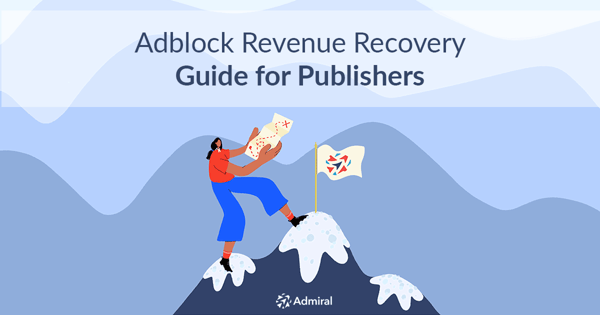
How Does Anti-Adblock Work?
There are a variety of techniques used to detect, measure, and reduce ad block rates. Solutions can encourage the user to turn off their ad blocker for sites they enjoy or guide them to a value exchange that benefits both parties. Most anti-adblock software, free adblock blocking scripts, or DIY efforts are limited to a single approach and a limited feature set.
Admiral offers the industry's most robust combination of recovery options and assistance, such as:
- Unlock/Allowlist Visitors - By engaging visitors directly, publishers can ask them to allowlist their specific site, unlocking the full value of their ad stack. Unlocking the full ad experience consistently returns the highest CPMs, ARPU, and RPV for publishers, vs any other method separately.
In fact, unlocked adblock users average 3-4X the CPM revenue as an average user. A combination of adblock recovery methods is the optimal approach. - Adblock detection: Experience is key here. There are dozens of adblock extensions, and each browser has its own built-in tools, with regular changes to adblock scripts and tactics. Admiral maintains the technical expertise to monitor feature changes in the cat-and-mouse changes by adblock developers and browsers.
- Offering a value-exchange
- donations campaigns appeal to users who wish to support the site's content
- offer access to ad-free content for a limited time if the user will signup for email newsletters or follow on social channels (Admiral can help)
- paid subscriptions and site registration are two options publishers can offer in exchange for ad-free access, building the relationship toward recurring revenue
- other: there is no limit to the creative ways a publisher can engage profitably with their adblocking visitors. Participation in user panels, special events, multi-site bundled offers, and more. Admiral's visitor engagement expertise can help publishers explore and test the best engagement options.
- Ad reinsertion: This solution checks to see if the visitor has chosen to allow ads that their adblock vendor has approved. Admiral facilitates and monitors the delivery of a standardized set of ads.
Robust visitor engagement solutions can redirect the user toward a more sustainable relationship. In the example below, Factinate uses Admiral to offer two paths, both are beneficial to the publisher.
One path leads to unlocking the full ad stack for visitors. The other path grows recurring subscription revenue. (Factinate anti-adblock case study)
How Do You Get Started With Anti-Adblock?
- First, you should sign up for a FREE analytics dashboard showing daily block rates and impact. Admiral Revenue Analytics will tell you everything you need to know about the impact of ad blocking on your website. It shows how much revenue you may be missing, block rates, mobile vs desktop, and more.
- Second, configure your recovery messaging. This messaging can ask users to whitelist your site, donate to quality journalism, or accept other win-win options.
This is usually the fastest, easiest way to recover revenue. Admiral's Customer Love team is very experienced in helping publishers create an engagement strategy and has templates and playbooks to make this step easy. - Third, optimize and test your message, layout, and offer. You can offer your users alternatives, such as ad-free passes, email signups, social follows, ad-lite experiences, and more.
Engagement-based solutions build a deeper, more profitable relationship with your audience.
How Long Does It Take to Recover Blocked Ad Revenue?
An anti-adblock and recovery solution can be installed in ten minutes, and data will start generating in your adblock analytics dashboard within a few hours. Implementing engagements to begin recovery can be launched in as little as 24 hours even for a large enterprise website.
Admiral's anti-adblock script installs in minutes with a single line of code added to a publisher's website. And it's free to use. Once the tag is on your website, additional recovery tools can be turned on at any time, no coding or additional installs are needed. Results start showing up in the dashboard in hours.
The software will detect and stop adblockers, and present them with the options you choose, such as disabling their adblocker, or purchasing an ad-free subscription, signing up for your newsletter, or other options you choose.
Should You Build or Buy an Anti-Adblock Solution?
Building an anti-adblock solution internally is not recommended due to the constant changes in adblock technology. The ongoing maintenance of anti-ad block technology isn't in their core competence.
Adblock vs recovery can be a cat-and-mouse game. A publisher would need developers to stay on top of changes across dozens of adblock extensions, adblock filter lists, and major browsers.
Most organizations are better off not reinventing the wheel. Creating anti-adblock filters requires a lot of time, effort, and money.
See more: Ten adblock recovery "build vs buy" considerations. Share with your software purchase decision-makers.
How Do You Find the Right Solution?
There are many vendors available that tout their ability to help publishers address adblocking. How can you know which is the right one?
- Technology. How intelligent are the solution's recovery methods? Is it using next-generation technology such as AI for CTA automation? Can they leverage adblock detection to grow subscriptions? Can they help recover high CPM video ad revenue?
- Transparency. Is it easy to access your analytics? Can you tell, at a glance, how well the anti-adblock solution is working?
- Customer service. How easy is it to communicate with customer service? Are they responsive and available? Do they place a high priority on customer service?
- UX and Product Vision. How easy and quickly can you launch their block adblock solution? Are there intuitive management tools? Do they have a plan for continued investment in their product and features?
Are you ready to maximize ad revenue?
Admiral's Adblock Recovery Module can be used separately or as part of the full Admiral Visitor Relationship Management (VRM) platform. Request a demo today!


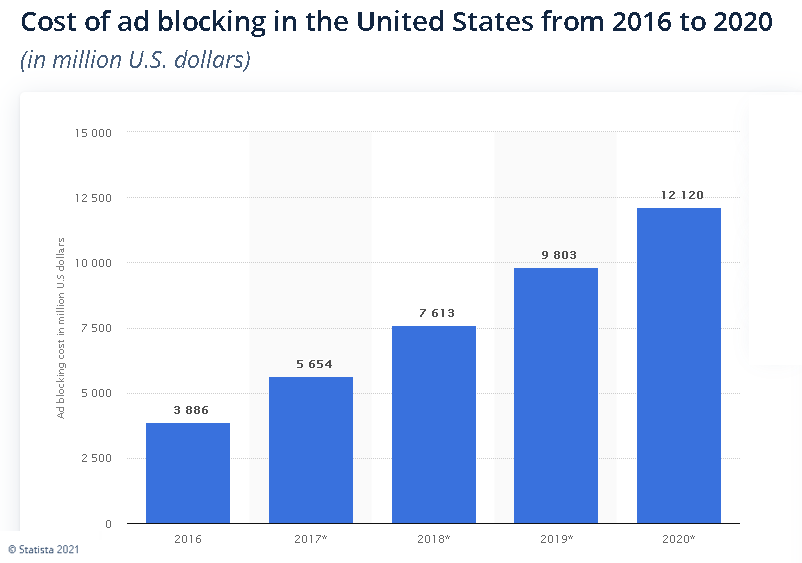


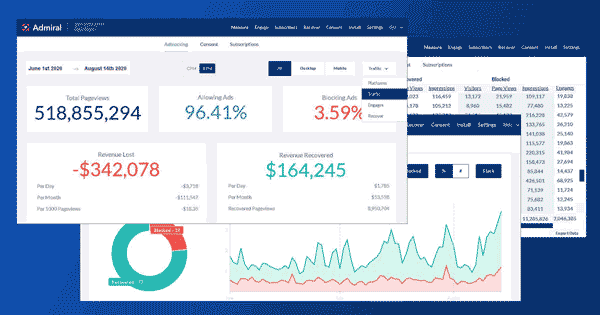
/Case%20Studies/Case-study_Admiral_vs_Alternative_revenue-recovery.png?width=1200&height=628&name=Case-study_Admiral_vs_Alternative_revenue-recovery.png)
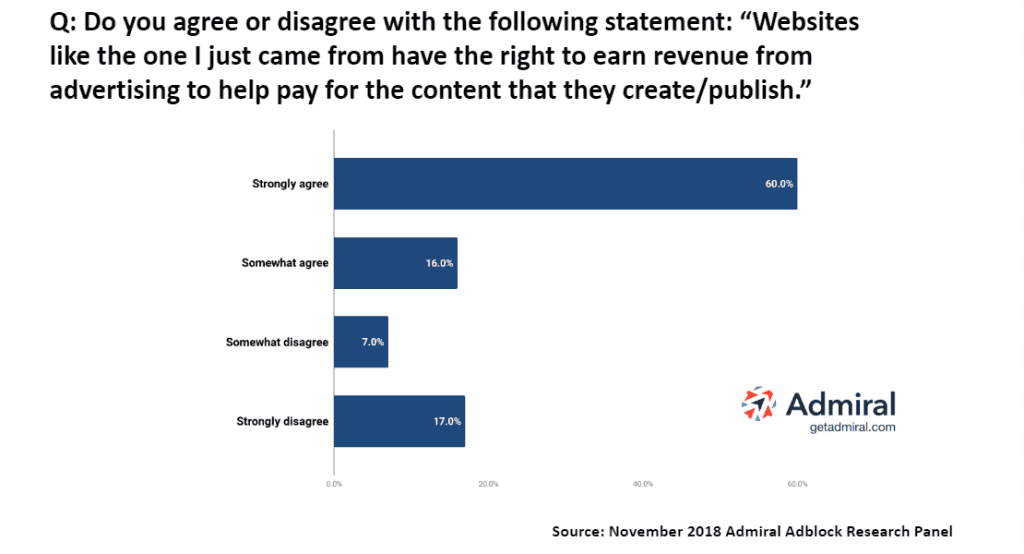

/Case%20Studies/Factinate_ABR-1-button_600.jpg?width=318&height=166&name=Factinate_ABR-1-button_600.jpg)
